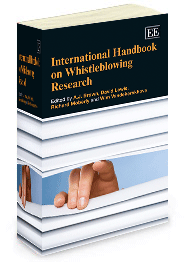
Whistleblower lawyer Jason Zuckerman is a contributing author to a new book titled International Handbook on Whistleblowing Research, which provides a comprehensive guide to existing research and blueprints for how new research should be conducted in the future. It covers conceptual and definitional fundamentals of whistleblowing and strategies for researching whistleblowing in an organizational context, as well as law reform, regulation, management practicalities and research ethics. It also charts the lessons of 30 years of empirical research and maps out new questions and projects for future decades. This Handbook, with its unique perspective on the complex, multi-faceted and often controversial nature of whistleblowing research, will be a vital resource for researchers, policymakers and organizations around the world.
Zuckerman contributed to a chapter titled “Whistleblower Support in Practice: Towards an Integrated Research Model,” which includes a discussion of whistleblower protections for federal employees, including the Whistleblower Protection Act.
The book is edited by A.J. Brown, Griffith University, Australia, David Lewis, Middlesex University, UK, Richard Moberly, University of Nebraska College of Law, US and Wim Vandekerckhove, University of Greenwich, UK
Description
‘This Handbook is testament to the value of whistleblowing for democracy, with new research and existing knowledge probed with fresh and urgent questions. What is the impact of global technology on public accountability, journalism and whistleblower protection? If indifference is what really matters, is focus on retaliation misplaced? What stops those in authority from heeding whistleblowers? A vital resource for anyone fighting to protect whistleblowers anywhere to better articulate whose interests are really at stake and what needs to be done.’
– Anna Myers, lawyer and Expert Coordinator of the Whistleblowing International Network (WIN)
In the modern age of institutions, whistleblowing is now established as one of the most important processes – if not the single most important process – by which governments and corporations are kept accountable to the societies they are meant to serve. This essential Handbook provides researchers and policy makers from around the world with a comprehensive overview of the state of our knowledge regarding this vital process. In addition to drawing from the last 30 years of progressively more systematic research into whistleblowing, it also provides cutting-edge analysis of the conceptual and practical challenges that researchers will want to confront in the next decade.
Contents
Contributors include: B. Bjørkelo, R. Bosua, A.J. Brown, H. Bye, K. Crow, T. Devine, S. Dreyfus, T. Morehead Dworkin, B. Edwards, B. Fasterling, T. Faunce, P. Harpur, R. Lederman, D. Lewis, J. Leys, K. Loyens, J. Maesschalck, B. Martin, D. Meyer, M. Miceli, S. Milton, R. Moberly, R. Morgan, J. Near, T. Nikolic, J. Olsen, M. Rehg, P. Roberts, M. Skivenes, R. Smith, M. Spencer, J. Spencer, S. Trygstad, E. Tsahuridu, T. Uys, W. Vandekerckhove, S. Walden, C. Wheeler, J. Zuckerman
‘This Handbook is testament to the value of whistleblowing for democracy, with new research and existing knowledge probed with fresh and urgent questions. What is the impact of global technology on public accountability, journalism and whistleblower protection? If indifference is what really matters, is focus on retaliation misplaced? What stops those in authority from heeding whistleblowers? A vital resource for anyone fighting to protect whistleblowers anywhere to better articulate whose interests are really at stake and what needs to be done.’
– Anna Myers, lawyer and Expert Coordinator of the Whistleblowing International Network (WIN)
‘The International Handbook on Whistleblowing Research offers a thorough and thoughtful examination of current approaches to research regarding this important topic. The editors have included the viewpoints of highly regarded researchers from a number of different fields, including the social sciences, business, and law. Unlike some collections of comments by experts in diverse fields, the editors have created a coherent and useful structure for an analysis of the status of whistleblowing research, the appropriate design for such research and its practical applications. The book casts new light on many topics crucial to the success or failure of whistleblower laws. Researchers, activists, policy makers and anyone interested in understanding whistleblowing and improving laws that encourage and protect it should read this indispensable work. A “who’s who” of the field and a depository of insights and ideas.’
– Robert Vaughn, American University Washington College of Law, US
Whistleblowing – the disclosure of wrongdoing by organizational insiders –is vital to modern public accountability and integrity across all organizations and societies. This important Handbook offers original, cutting-edge analyses of the conceptual and practical challenges that researchers face in order to better inform the way whistleblowing is understood and confronted by organizations, regulatory authorities and governments.
Featuring contributions from scholars and policy practitioners in a number of diverse fields – including sociology, political science, psychology, information systems, media studies, business, management, criminology, public policy and several branches of law – the book provides a comprehensive guide to existing research and blueprints for how new research should be conducted in the future. It covers conceptual and definitional fundamentals of whistleblowing and strategies for researching whistleblowing in an organizational context, as well as law reform, regulation, management practicalities and research ethics. It also charts the lessons of 30 years of empirical research and maps out new questions and projects for future decades.
This Handbook, with its unique perspective on the complex, multi-faceted and often controversial nature of whistleblowing research, will be a vital resource for researchers, policymakers and organizations around the world.







